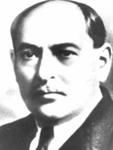Narimanov Nariman Najaf
Narimanov Nariman Najaf

(04.04.1870 - 19.03.1925)
Tenure of Office
(04.1920 - 05.1921)
One of the prominent statesmen and politicians, writers and diplomats of Azerbaijan Nariman Karbalayi Najaf oglu Narimanov was born on April 14, 1870, in Tiflis. After finishing the Muslim spiritual school in Tiflis, he entered the Transcaucasian Teachers Seminary in Gori in 1885. Having successfully graduated from the Transcaucasian Teachers Seminary in June 1890, N.Narimanov was appointed as a teacher in the Gizil Hajili village of the Tiflis province.
N.Narimanov came to Baku in 1891 and continued his teaching and enlightenment activities. In 1894, N.Narimanov with the help of the leading intellectuals of Azerbaijan opened in Baku the first public library in the East – the reading room. In 1895-1901, along with teaching, N.Narimanov began literary and socio-political activities in Baku and during this time he wrote such well-known novels as "Bahadur and Sona", "Nadir shah" and the like.
In 1902, he received an academic certificate by taking an extern exam at the Baku male gymnasium, and entered the faculty medicine of the Novorossiysk University in Odessa. Fearing from the revolutionary manifestations, the Tsarist government temporarily closed the University in 1905, and Narimanov had to return to Baku. In 1905, he joined the “Hummet” Social Democratic Party in Baku and participated in the creation of the “Mujahideen”, the Iranian Social Democratic Party. After graduating from the medical faculty of the Odessa University in 1908, N.Narimanov came to Baku and began to work as a doctor in a city hospital. In 1909, because of the police pursuit, he left for Tbilisi and began working as a doctor there. He was arrested in March of that year for his revolutionary activities and six months later he was exiled to Astrakhan. N.Narimanov returned to Baku on July 15, 1913. He worked in various hospitals in Baku as a doctor, department manager and director while at the same time continued his literary and social activities.
The Congress of the All-Caucasus Muslims was held in Baku on 15-20 April, 1917. N.Narimanov participated in the Congress at the instruction of “Hummet” Committee, and together with M.Rasulzadeh, A.Topchubashov, M.Hajinski and others was elected to the Presidium of the Congress.
In April-December 1917, N.Narimanov chaired meetings of the members of “Hummet” organization, was elected the chairman of the committee, and under his editorship the "Hummat" newspaper began to be published.
At the end of June 1919, N.Narimanov was summoned to Moscow by the Central Committee of Russian Communist Party. He for the first time met with V.Lenin, Chairman of the RSFSR Council of the People’s Commissars. From July 1919 to May 1920 N.Narimanov held various positions in Moscow: he was the head of the Middle East Department of the RSFSR People's Commissariat for Foreign Affairs, the Deputy People’s Commissar for Nationalities of the RSFSR, and a member of the board the Commissariat.
On April 27, when the Interim Revolutionary Committee of Azerbaijan was established, N.Narimanov was elected a Chairman in absentia. On April 28, at the meeting of the Interim Revolutionary Committee of Azerbaijan the Council of People's Commissars of Azerbaijan SSR was organized, and N.Narimanov was appointed Chairman of the Council of People's Commissars and People’s Commissar for Foreign Affairs.
From April 28, 1920 to March 12, 1922 N.Narimanov worked as Chairman of the Azerbaijan Revolutionary Committee, the Council of People's Commissars of Azerbaijan SSR and the Council of Defense.
As a member of the Soviet delegation, N.Narimanov participated in the International Genoa Conference (1922). He was elected the Chairman of the Central Executive Committee (CEC) of the USSR from the Transcaucasian Socialist Federative Soviet Republic (TSFSR) at the first session of CEC established in the I Congress of USSR Soviets (December 1922).
N.Narimanov died unexpectedly in Moscow on the evening of March 19, 1925. On March 23, N.Narimanov was buried near the Lenin Mausoleum at the Red Square in Moscow.
